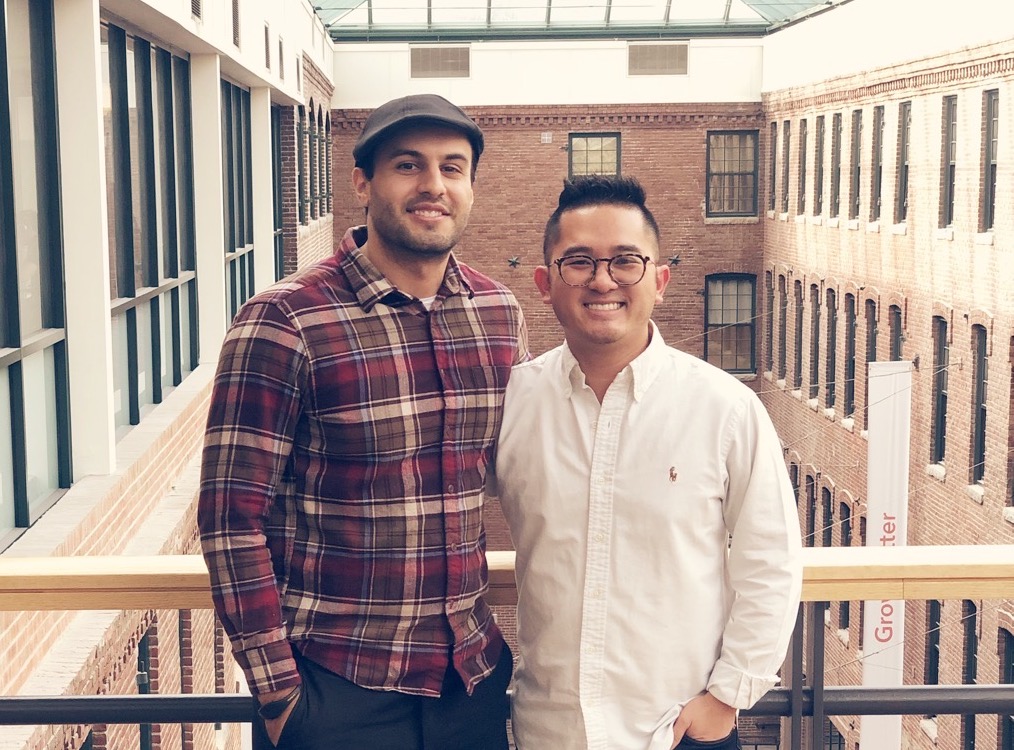About the Series
In our Campus to Career series, I sit down and chat with remarkable people about how they started and grew their career.
.png?width=1280&name=Careers%20Blog%20-%20Campus%20to%20Career%20logo%20(1).png)
What was going through the mind of their college self? What prepared them for a job? What worked (or didn’t work) for them in their career search? What would they have done differently? What is their career today and what do they love about it?
Every episode is an opportunity to uncover these questions and more, and our goal is to provide some advice and inspiration to spark your career path.
Transcript
VC: Caroline, thanks for joining us.
CF: Glad to be here. Excited!
VC: You're our second guest of our season, so very happy for you to be taking time out of your schedule.
I have lots of questions for you because I've loved your story about how you've grown at HubSpot, how [Boston University] got you here, so let's start to talk about what your role is here at HubSpot.
Talk us through where you started and what brought you to where you are now.
CF: I started as a Customer Support Specialist.
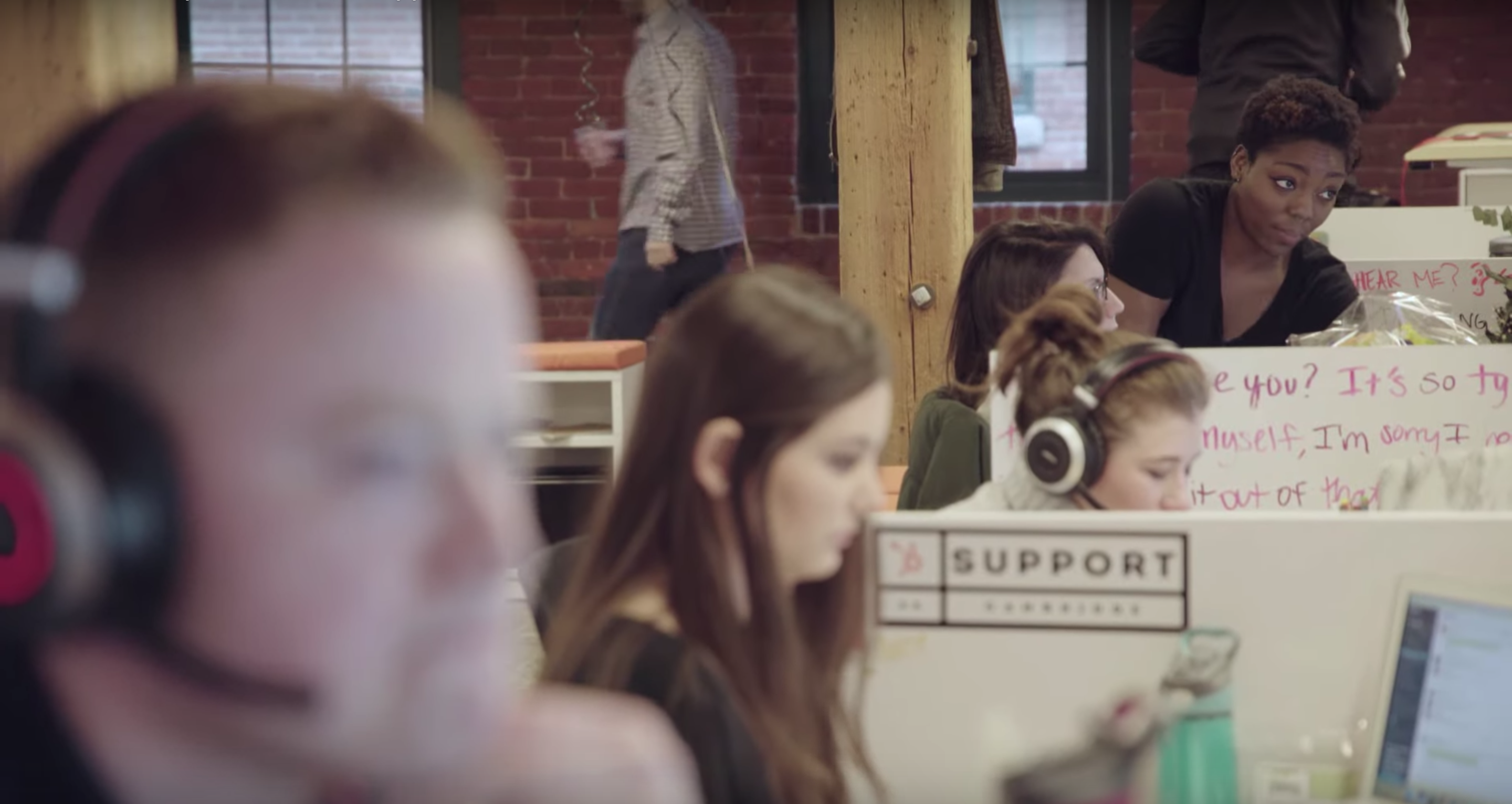
I was doing that role for about two years, and within that time, I was mentoring people and realized that I liked that role, liked being a mentor for other people going through the same thing I went through. Then about two years ago, I became a team lead, which is similar to a mentor.
As a team lead, we onboard our new hires here, and I’m just making sure that people are finding success in the role. I partner a lot with their managers to make sure the team is where they need to be. People come to me for anything, and I’ve been doing that for about two years now.
VC: Anything and everything, I’m sure. Work things, life things.
CF: Exactly!
VC: Remind me - when did you start again?
CF: I started in August 2016. I started right out of college. I think I had three months off before actually starting at HubSpot, and I will be hitting my four years this August, so crazy how time flies!
VC: I know! You’ve had so many different kinds of experiences too - from starting in our Portsmouth, NH office, then coming to Cambridge, and you’re now a team lead.
You’ve also done some really awesome things too to help some teams grow at HubSpot too, so we’re definitely going to talk about all that.
Before we talk about that, I wanted to talk about your college experience a little bit because you went to BU, but what part of BU were you at? Major? Which school [at BU} did you go to, and when did you graduate?
CF: I started at BU undecided, and then I decided I was going to do math. So, math major. Then I decided it was not what I really wanted, so I switched to the business school in my sophomore year, so I ended up graduating from the Questrom School of Business [at Boston University]. I was a marketing and operations concentrator, and I minored in Spanish. I like to keep the language aspect there, so I did a lot at school.
Along the way, I didn’t really know what I wanted. I picked things along the way that I liked, so operations had numbers, so I wanted to keep that. I thought marketing was interesting, so I went with that.
I think one thing that was a challenge was being in the business school, there are a lot of people around you that are very motivated, which is a great thing, but it can overwhelm you because you’re seeing all these people that are going to these Big Four companies. And you think that’s the path that you need to take, so I struggled a lot with that.
My one internship that I did have was at a radio station. Totally not in line with what you would think for a business student, and that was actually the thing that HubSpot found the most interesting in my interviews.
VC: Did you have a show on the radio? What was your radio station experience?
CF: Yeah, I was doing marketing events, so half of my time was in the office, updating the website and calling listeners if they won something.
Then half of my time was actually at events either promoting concerts that we have or being at the concerts, so again, marketing events was kind of in line with [Customer] Support now because I talk to people all the time now in Support, helping customers.
So, not the traditional background, I would say, for a business student, but I like to tell people now that you should create your path because it can work out in ways that sometimes you can’t plan.
VC: Are you a planner?
CF: I am a planner!
VC: So, how was that trying to overcome that? Because I definitely know what that’s like. I had a five-year plan as I was about to graduate from college, and then it went out the window after I went to one interview. So, what was that like trying to overcome not having that plan and finding HubSpot as a result?
CF: I actually hate that question, “what’s your five year plan?” Because as I’m experiencing things through life, I’m, like, “you can’t really plan THAT far ahead.” You can have goals, for sure, and work towards those, but I feel like those change as you’re working towards those goals.
I would say, the one thing that helped me was focusing on what I’m doing at the moment, and if I like it, being OK with being where I am without rushing into things.
I even tell that to my reps now. If they’re trying to move onto the next thing too quickly, I’m like, “Let’s just focus on what you’re doing now because when you do that, you’ll start discovering what you like and what you don’t like” versus trying to rush into something that eventually you’re going to be like, “Oh wait, that’s not what I wanted.”
Definitely keeping the focus and doing your job well now are, whether that’s a student doing their work well but just focusing on the right now.
VC: I like that aspect of honing your craft in the moment because it can evolve into something.
I definitely relate to that. When I graduated from college, I wanted to go into clinical psychology, wanted to go work in a lab, and realized it wasn’t the right fit for me because I wanted to be more interactive with people.
I wanted to actually spend more time talking to people rather than be behind a computer or punching numbers and data - so I went into sales, which was definitely not part of my plan, but I realized it catered to a lot of what I was interested in: technology, loved helping people through how to change the way they did things through technology like an iPhone and a computer.
CF: You can also transfer those skills too, so even if you’re not in the role you want to be in now, there’s always a skill that is going to carry over to something else that you actually do want to do.
By focusing on what you’re doing and doing well at it, you can bring those skills that you’re becoming an expert in into something else.
VC: I agree. I didn’t realize this at the time, but all of those things I did to create great customer experiences [in sales] and also being a mentor to a lot of my current teammates, it actually opened me up to a world that I didn’t know was a thing, which was people operations and human resources.
That’s actually how I got my start [in this field] was because I loved mentoring people. I actually started that path of HR-ish things by being invited to become a new hire trainer, which was not expected, but it opened me up to this whole world that I didn’t think existed.
I love that you have that advice because it’s great advice. I had a five-year plan like I said, and it just did not work out.
CF: Always.
VC: So then, you went from being a business major to HubSpot, so how did HubSpot get on your radar in the first place?
CF: Being across the river, you definitely learn about HubSpot in your marketing classes, but what actually got me interested in HubSpot was, while I was at BU, I was the events coordinator for our BU Marketing Club. We brought in a HubSpotter, who was actually a BU alum, and she was talking about her job and was also in Support.
She was just so passionate about what she did. Seeing that passion - I was like, “I want to be in a job that I have that much passion for what I do and where I work.” And I connected with her after the event, and she was like, “Yeah, you should definitely come see the office.”
So I came over to HubSpot and in that moment, I told myself that this was where I want to be - and from there on, my eyes were just on HubSpot. And I would do anything to work there because of that one person, and I’m actually still connected to her.
She’s moved on to another company, but such a great role model and mentor to have. So it worked out in all the best ways - I have a mentor, I’m at the company that I want to be at.
VC: I know you said you’d do anything to come to HubSpot, so you mentioned you started in Portsmouth. How did you go from Boston to Portsmouth?
CF: Again, I wanted to be at HubSpot, and the only open positions in Support were only in Portsmouth because at that time, we were growing that office. I said, “You know what? I’m just going to make the sacrifice, and I’m going to drive up there.”
 Thankfully, I live a little bit north of Boston, so I was already closer, but I was driving 500 miles a week, I think. I racked up a lot of miles on my car, so that was dedication.
Thankfully, I live a little bit north of Boston, so I was already closer, but I was driving 500 miles a week, I think. I racked up a lot of miles on my car, so that was dedication.
Then a year in, the commute was getting long, and there was just so many things I wanted to be involved in in Cambridge, so I moved down to Cambridge, which was also a transition.
Our Portsmouth office was very small, but it was very easy to get to know people.
 Coming down to Cambridge, we have a huge building here and a lot of different employees, so there wasn’t a place where everyone would go eat lunch.
Coming down to Cambridge, we have a huge building here and a lot of different employees, so there wasn’t a place where everyone would go eat lunch.
I ended up eating lunch alone a lot of the time, but what I did to get to know people here was, I came to Cambridge a couple times a month before I officially transferred down here. I knew I had to start making friends, so I was like, “OK, what do people like that I can use as an introduction?”
I then would go across the street - true story - and go to Dunkin’ Donuts for a box of Munchkins. (For those of you that don’t know what Munchkins are, they’re just donut holes.) I would go around the Support floor, and I would offer a Munchkin. At the same time, I would say, “Hey, I’m Caroline, and I’m from the Portsmouth office.”
And I got to know the team so that way, when I could actually transfer down to Cambridge, I knew a lot of people, but it took a lot of work. It also took my extrovert personality to come out because you have to put yourself out there, and it’s a little nerve-wracking to just go up to someone random and make a connection.
But I had to do it, otherwise I would have come down here and maybe not have made as many friends as quickly as I did.
VC: Growing up, I was always told that food was always the way to get into someone’s heart, so it worked!
CF: Yeah, I’m Portuguese and Brazilian, so definitely food is huge. Maybe that was it, maybe that was coming out naturally.
VC: Which I believe is such a good fit for HubSpot anyway because I feel like we’re very food-motivated. Some of our coolest perks are around food traditions like Waffle Wednesdays or end-of-month pizza.
CF: Yeah, I definitely need to eat every two hours, and my team knows that, so thankfully, I have the food here and I have the flexibility to go get a snack when I need one when you know you’re getting “hangry.”
VC: If anyone wants to come visit any of our [global] HubSpot offices, we will gladly show you the kitchen.
You made the move from Portsmouth to Cambridge, and you mentioned you are now a team lead. What was your transition like from becoming a customer support specialist to a team lead?
CF: It’s similar to college where I didn’t know where I wanted to be.
As a Support rep, a lot of people tend to gravitate towards a certain part of the tool and become a Specialist in that. I didn’t feel that passion, and when I was in Portsmouth, I was sitting at this desk that was very central. I ended up talking to a lot of people that were asking a lot of questions, so I started realizing that I like mentoring people.
When I moved down to Cambridge, there was an actual opportunity to become an official mentor, so on top of my job, I became a mentor. I was dedicating a few hours of the week to actually spend with people and help them grow.
Then along the way, I got an opportunity to become the first Portuguese rep and start that Portuguese Support team, so that was my first experience as a leader.
I remember being so scared because even though both of my parents speak Portuguese, we never spoke it [at home] when I was a child. When my parents came to this country, it wasn’t the best thing to be speaking another language, so they strictly spoke English and I wasn’t fluent in [Portuguese] so I was definitely scared.
As I started meeting people though, [being scared] was not an option. They want me and they need me to do this, so I’m just going to step up to the plate and challenge myself.
It ended up being not as scary as I thought it would be. The customers are really nice, and as I started talking more in Portuguese, it actually came naturally. Even the technical stuff, you learn as you start talking about it more and more.
So I started the Portuguese Support team, and we’ve grown and hired people. They’ve moved onto different roles, so I’m super proud to know that that all started with me. To see all those people in different roles now succeeding.
They always come to me and talk about how I was such a huge influence to them, so that’s awesome to see. Even though I’m not on that team anymore, I still work with them and help them grow.
That was my first experience being a leader.
It took me down a different path, for sure, because I was mentoring and then I was starting that team. Shortly after I started that team, an opportunity came up for team leads and actually, it was a new role. It wasn’t something we had before, and I was like, “Wow, this is exactly what I’ve been doing.” Mentoring people? It’s something that I loved.
People were reaching out to me about the role, which was when I knew.
VC: Seems like you were a natural fit!
CF: It was tough because I had to choose between my Portuguese baby that I had started and going to Team Lead. I ultimately decided to become a team lead. I knew I would still have the opportunity to work with those people, so for me, I felt a little better leaving them.
As a team lead, similar to a mentor, they will work with new hires and their onboarding. We’ll do mock calls with them, shadow them, and work with you throughout your Support journey to make sure you’re finding success in the role. It’s like the ultimate mentor.
VC: You literally had been working up to that moment. You really took your advice about being great at your craft and now, look what it turned into!
CF: As a team lead, you gain a lot of leadership and management skills. We work closely with managers to get a pulse on the team, so I’ve been able to grow those skills.
Again, not the path that I thought I would be down, but definitely has led me to awesome things.
Because of all this too, last May, I got to spend a month in Bogota to start our Support team there. They had no managers or anything at the time, so I was leading those Support new hires. It’s awesome to see all these things I’ve had a hand in really succeeding now.
 VC: I know you’ve met Jenner, who was our first guest this season and also had a similar opportunity down there. What was it like for you to have that much autonomy to grow something like that down in Bogota?
VC: I know you’ve met Jenner, who was our first guest this season and also had a similar opportunity down there. What was it like for you to have that much autonomy to grow something like that down in Bogota?
CF: The good thing about HubSpot is that you have autonomy, but sometimes, that can make you nervous. You almost wonder, “Are you sure I can make these decisions?” And a lot of times, they’re just like, “Yup, do your thing.”
I remember going down to Bogota, and I’m not just a team lead at this point. They have no manager that’s directly there. We have managers here they can work with, but they need someone that’s going to fully support them, so I have to be the best role model I can be.
In every decision I made, I had to think about everything - not only them, but what the company needs too.
It’s definitely nerve-wracking, but the company gets you a lot of autonomy for a reason because they hire the right people and know you’re going to do the right thing. I kept telling the new hires jokingly that, “You guys better do good because this is all on me!”
It was awesome, and I still keep in touch with them so it’s great to see that growth.
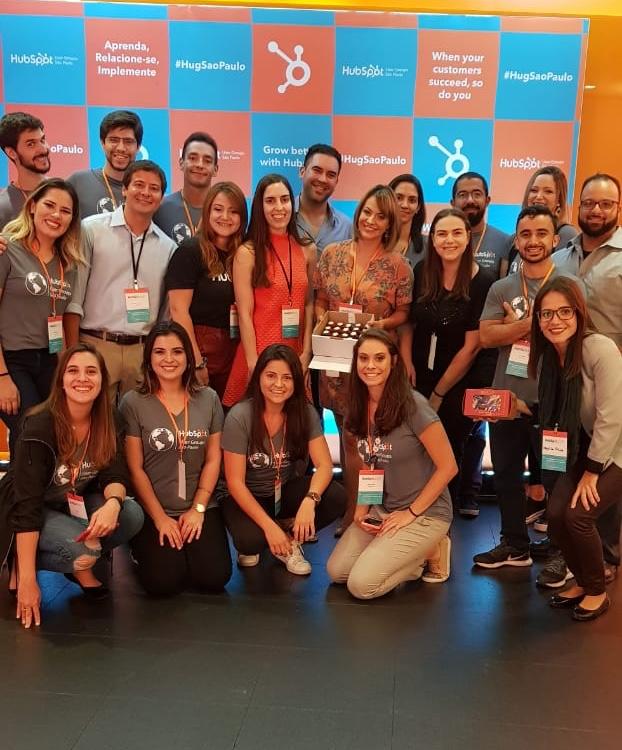
CF: I want to highlight the team lead role a little bit more. You mentioned that it’s a new role, and I think that it’s so awesome to create opportunities like that for folks like you who are natural mentors and to also provide that much support to new and existing teammates.
VC: Why is this role so important for someone new to HubSpot? Because there’s this perception that you need to be super technical focused and need to know everything about marketing and our tools before you start here.
CF: I think the best thing about team leads is that they’ve done the role before. They’ve been in the Support role, one way or another, so we’ve struggled with the same things that someone else might have struggled with. It’s great for that person to see and have that leader that can say, “Hey, I’ve experienced the same thing, but let’s work on this together to get you where you want to be.”
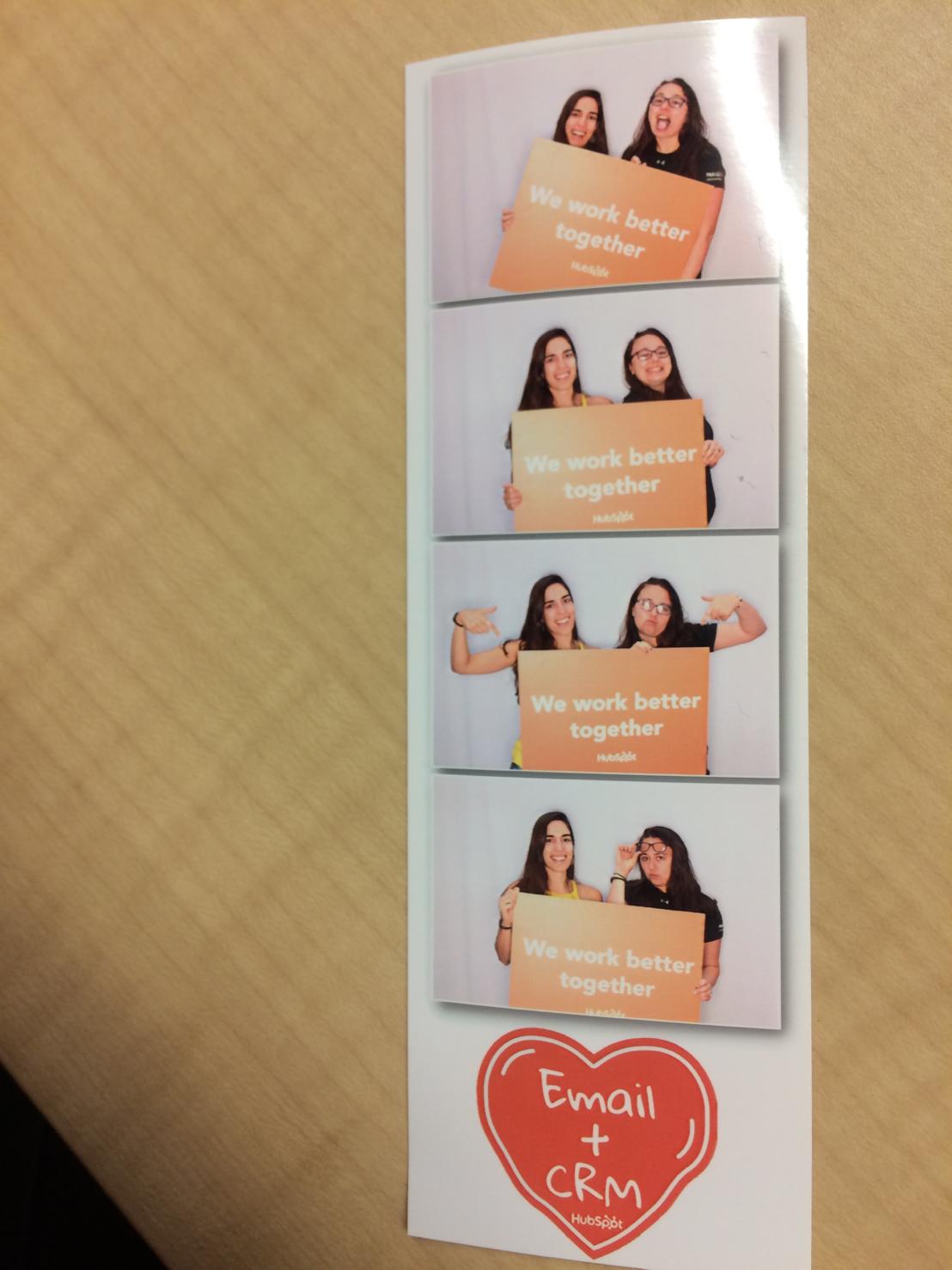 It’s also a role model for them because they see this person that also was in the same role as them and now doing a leadership role. Maybe that’s not something they envision, but maybe once they work with you, they see that.
It’s also a role model for them because they see this person that also was in the same role as them and now doing a leadership role. Maybe that’s not something they envision, but maybe once they work with you, they see that.
As a Support rep, it’s a hard job. It is technical. I didn’t come in with a technical background, and I think that’s something people worry about a lot. It’s nice to be able to reassure them that, “We’re going to get you through this, no matter what it takes.” I will do whatever I can for my teammates because I believe in all of them.
I think as a team lead, it’s really important for our team to feel like they can do this, do this role. We’ll see what they’re struggling with, and we’re going to overcome that.
I find that this role has been very beneficial. I didn’t have a team lead or mentor when I started, so when I got into the role, it was like,”OK, you’re in it.” After we went through training, we just did our thing.
I think now it’s nice that there’s someone to have that support with from beginning to end through their whole Support journey.
VC: And it’s to also create a different experience for everyone that’s starting. Something that I’m learning is how much you like to give back to people, help people overcome those challenges you’ve had, and make sure that others don’t have that same experience, it seems like.
When you do onboard new Support reps, is it something that’s only overnight? Across a few weeks? How much time do you spend with people to help them feel confident?
CF: New hires will spend two weeks with their team leads during their formal training [in their first month]. From there on, it depends on the person and how much support they feel like they need.
If you feel like you need to boost your confidence or are not feeling 100% in the role, I’ll meet with you daily, or maybe I’ll meet with you weekly.
Also, some people go into ebbs and flows, where they’re doing good and they’re like, “OK, I want to get to this next role. Can you give me feedback or can you help me gain some skills to get to that point?”
[Team members] might not utilize me for a couple months, and then they might come back. Usually, I am checking in with people pretty frequently just to make sure because sometimes people don’t come to a leader; they hold back a little. That’s why I always want to check-in to make sure people are feeling okay, even if they’re not coming to me.
Our priority though is new hires. We have the two weeks with them, and then we closely monitor new hires right after training because we know they are still ramping into the role.
That doesn’t mean though that I’m not working with tenured reps because they still need support too; it’s just at a lower frequency.
VC: Right, you’re almost like a personal trainer. It’s the case of [people] will need you when they need you. Whether they know it or not, it’s great that you have the ability to be proactive. You’re there to truly be their champion, which I love.
Something that you and I have talked about is that you’re the only female team lead [in Cambridge], right?
CF: For North America excluding remote, yes, I am the only female team lead. I realized that a couple months ago, and was like, “Wow, I’m really proud of that. I did not realize that.”
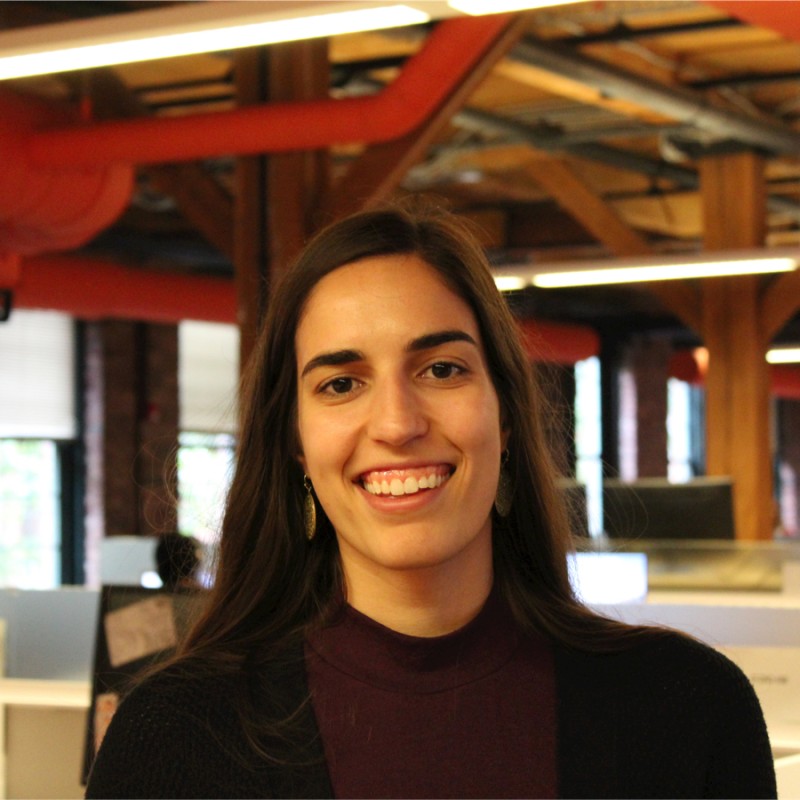
VC: What’s it like to be a strong female figure in leadership? Because right now in the world, we don’t have enough female leaders in the workplace, and I think we’re very hyper-aware of that at HubSpot. We really try to pave pathways to help women get there, so for you, what has it been like to be a leader in this capacity here?
CF: I didn’t realize, at first, that [being a leader as a female] had such a big impact on other female support specialists. I think in this past year, I really started thinking about how I’m making an impact on their professional careers, but outside of HubSpot too.
I’ve had people that have come to me that I never really talk to, and they’re just like, “You are a role model to me. You’re so confident. You’re so cool.” And that’s something I didn’t even realize was happening.
I think I just, again, focused on what I was doing, and did it well. Once I realized, “Oh my gosh, I’m a role model for these people,” that put the pressure on me to have to succeed, to make these people proud and see that they can get to this point too.
Honestly, I just do my thing, and I want people to know that you can do whatever you want to do, if you just put the passion in. You don’t have to be the most talkative person in the room, but just doing what you do well shows a lot.
I work with a lot of female support specialists and get them to where they want to be. Someone on my team just got a new role, and it was something that they said; they said I was the person that got them there and build their confidence up.
I think we do need to have female leaders because these people need someone to look up to; they need someone to talk to. I’ve had people before say, “Hey, I want to tell a team lead something, but I don’t feel comfortable going to the males. I want to tell you.” I think that was a big pivotal moment, where I thought, “Wow, this matters.”
We need to have this kind of representation because they need to see someone in the role that is similar to them, so even now, I try to bring these topics to management as well to make them aware.
[For example,] being involved with [and supporting] language-speaking reps? That might not be something that people are aware of. That’s why I try to bring these topics above team leads so that we can keep an eye on these things because we need to represent [and support] these different groups too.
VC: I love that - and just curious, it’s Women’s History Month and International Women’s Day is coming up. This conversation is not one we should have only in March; it should happen all the time.
[What you bring up] serves as yet another reminder that we need to pave the way more for women to have access to roles like yours, to show role models that lead by example, and show that women can do it too.
Is there a female figure in your life that really inspires you and why do they inspire you so much?
CF: Both of my grandmothers actually.
On my mom’s side, my grandmother came to the US from Portugal with nine kids. She brought a big family here; she was just a very strong woman. She lived to be about 102 [years old], so until the end, she was very strong. I always think about her coming here with all these kids. Bringing her family into a new environment and having to support that family is pretty amazing, I think.
My dad’s mom who lives in Brazil - she was a single mom and currently still lives alone. I always thought, “How can she do that?” You have to be really strong to live on your own [and be independent].
She’s had breast cancer a few times as well. Having her son here in the US, she’s far away from people she loves, but she still stays strong and I think that’s pretty amazing. I would hope that if I ever have these experiences that I would be just as strong.
Having these people in my family, I would want to live up to that. If I ever had children, I would hope that they would also see the things that they have done in my life, like how I was the first person out of my family to get a bachelor’s [degree]. I would want my kids to see my journey as well and hopefully I would show strength from that [experience].
VC: Again, you’re leading by example and, I think, you’re also continuing to do that here at HubSpot, but also outside of HubSpot. I know that you personally love to mentor outside of HubSpot too.
I know you go back to BU to give back to students, and help them discover the path that you’ve had and share advice - so career advice is something that students are always itching to have so if you had to give advice to your younger self, what would it be?
CF: Don’t be afraid to do something different. In college and in life in general, it’s easy to look at the people around you and say, “Oh well, I’m not there yet” or “I need to be there.” And it’s okay to make your own path and do something different because it’s always going to work out.
Like I was saying earlier, if you put the passion in and do what you’re doing well and put focus in that, that’s what is going to lead to new opportunities that you didn’t even think of. So, don’t feel like you have to go down the traditional path.
Also, don’t rush into things. You don’t need to be where everyone else is. You might be on a slower path, and that’s okay because it’s working for you. Just make sure that in what you’re doing, you have passion in it and everything will work out.
VC: It’s so hard to keep the noise out when you have those friends that you are moving faster than you, or maybe you’re getting pressure from [other] external forces. I know for me, my family wanted me to go to [medical] school and be a doctor, and that was a path that I just didn’t feel passionate about as I got older, so I really had to center on what my inner Viennie was saying about where I want to go.
It’s never easy though, so what helped you keep out the noise?
CF: It’s really funny because I tell my team now since people in the [Support] role are always comparing themselves to other people, and I always say to put your blinders on. I always see those horses with the things blocking their eyes. That was me; I would put those on because if I keep paying attention to other people, I’m not going to go anywhere.
I just need to do my own thing, and I also go a lot by what I feel is right and what I’m passionate about.
If I was talking to an accounting firm and I didn’t feel interested in it, I knew I wasn’t going to put the time and effort in so I focused more on the things that I actually liked.
Luckily, I have parents who have done similar things. Their life has led them in different places, but they always focused on what they like so I did have the support of my parents saying to do what you love. That definitely helped.
VC: That should always be the message!
We talked earlier about how more women should be propelled into leadership roles and there should be more representation, so what would be some advice you would give to a woman who is still in college and maybe wants to explore leadership one day? What should she start working on right now and how can she develop the confidence to do that?
CF: I would find a mentor. Whatever situation you’re going into, you can have that person to guide you because they’ve probably gone through similar experiences and can guide you into the best way to approach it. That same BU alum that got me to HubSpot, I still have her as a mentor.
I also would recommend finding something outside of professional life that builds your confidence. I have actually found a passion in fitness, and a couple years ago, started doing pole fitness. I can tell you that I was NOT that confident in starting it, but going through that journey, made me more confident in my professional life as well.
As you’re going through that, you have these moves that you can’t conquer - and when you do conquer them, you feel great. So, even finding something outside of school or work that can boost your confidence - maybe you join a club that you speak in front of people and that can build your confidence. There’s so many different avenues you can take; it doesn’t have to be professional. It can be something that’s so unique and personal.
VC: I love that so much. Sometimes when you just feel so discouraged at work, you need to find inspiration elsewhere and I love that. Clearly, it has had a big impact on you!
For me, my inspiration is food!
CF: Maybe you cook and that’s the thing that builds your confidence! You make that great meal and when people love it, you’re like, “Oh, I’m feeling really good right now.” Then when you continue doing it, you build confidence without realizing.
 So my tips: 1) get a mentor and ask that mentor for advice because they’ve probably been in the same place and 2) find your confidence in something outside of professional life.
So my tips: 1) get a mentor and ask that mentor for advice because they’ve probably been in the same place and 2) find your confidence in something outside of professional life.
VC: I wish that I had you as a mentor when I was younger because I didn’t have a lot of confidence in myself and wished I had learned tips like this sooner instead of now ten years after college.
CF: It’s always that way.
VC: Yeah, it’s always like, “What if [this happened instead]?” But that’s why we have stories like yours to learn from.
CF: Thank you for having me; it was great chatting, and I always love to share things with students because any way I can help, making an impact is awesome. If I can help someone decide on what they want to do after school or during school, I love doing that.
VC: I can see the mentor in you coming out! I can see why the team lead is a perfect role for you.
Congrats on all the success you’ve had over the past four years - and now you’re one year closer to your HubSpot sabbatical so you definitely deserve that! And also thanks so much for always giving back to students and helping them pave the way for themselves. It’s such a great thing you’re doing.
Thanks so much for your time too!
CF: Thank you, of course!
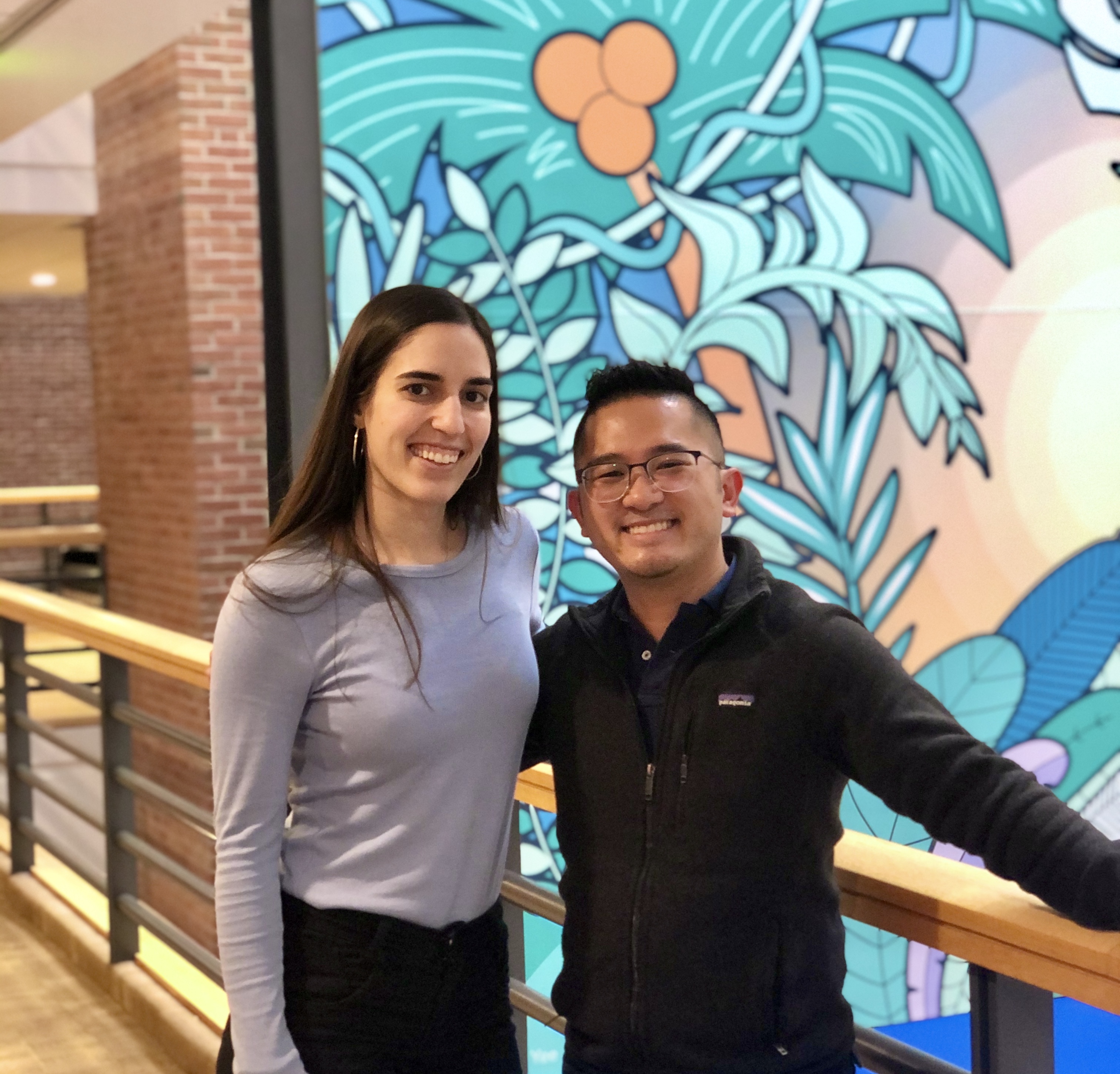

-2.jpg)
-25.png)

